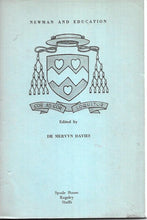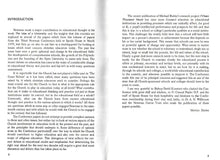Used Very Good
'INTRODUCTION
Newman made a major contribution to educational thought in his
work The idea of a University and the insights that this contains are
explored in several of the papers which form this volume of papers
from the Third Newman Conference held at Spode House in March
1979, but they go on also to use him as a starting point for looking at
issues which must concern christian educators today. The past few
years have seen a great upheaval and change in the educational field:
the development of comprehensive schools, the growth of the Polytech-
nics and the founding of the Open University to name only three. The
recent debate on education has come in the wake of considerable change
in educational theory and practice and has left us with many questions
unanswered.
It is regrettable that the Church has not played a fuller part in 'The
Great Debate' as it has been called, since many questions have been
raised by it which christian educators need to consider. Perhaps the
most crucial one for the Church to face is what is the appropriate role
for the Church to play in education today at all levels? What contribu-
tion can it make to educational thinking and practice not just in those
institutions under its control, but in the educational field as a whole?
Conversely, what can the Church learn from current educational
thought and practice in the various spheres in which it works? All these
are questions which in some way or other engaged Newman in the nine-
teenth century and with which he would wish the Church to be engaged
in the century that has followed.
The Conference papers do not attempt to provide complete answers
to these and other issues, but rather try to look at various aspects of the
Church involvement in education both in the present and the past, and
at the principles that should underpin it. Some difference of opinion
arose in the Conference particularly over the way in which the Church
should contribute to higher education and also over the nature and
scope of religious education. This divergence of view reflects the cur.
rent debate in educational circles and emphasises that determining the
right way ahead for the next two decades will require a great deal more
discussion and debate than has taken place so far...'




